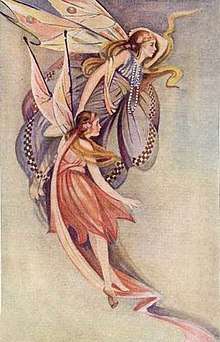Edith Howes
Edith Annie Howes (29 August 1872 – 9 July 1954) was a New Zealand teacher, educationalist, and writer of children's literature. She was a Member of the Order of the British Empire and received the King George VI Coronation Medal for her services to literature.
Edith Annie Howes | |
|---|---|
 in the 1900s | |
| Born | 29 August 1872 London |
| Died | 1954 |
| Nationality | New Zealand |
| Known for | Children's books |
Family and education
She was born in London, England, one of five children of Cecilia Brown and William Howes, a post office clerk and accountant.[1] Her brother George became a noted entomologist.
The family emigrated to New Zealand when she was very young. She attended Kaiapoi Borough School, where she later became a pupil teacher.[1]
Teaching career
In 1893 she completed her training to become a teacher at Christchurch.[1] She taught at several different schools including Ashburton, Wanganui, and Makarewa before becoming the infant mistress at Gore School in 1899.[1] She eventually rose to be headmistress, remaining in that position from 1914 until 1917.[1]
In 1917 she moved to the Wellington Girls' College, where she was the head of the junior department.[1] She stayed in this position until 1919, when she retired from teaching.[1]
Howe was an early advocate for the Montessori method and the philosophy behind kindergartens.[1] She became known as an educational reformer, pushing for a less institutional learning environment featuring smaller class sizes and quieter, more comfortable classrooms.[1] She was a feminist who believed strongly that higher education was critical for women to participate fully in civic life.[1]

Writings
Howe began writing children's books around 1910, believing that stories and songs helped children to learn.[1] Although she worked in the genre of fairy tales, she saw that there was not enough written material on scientific subjects available to New Zealand schoolchildren, so she made a point of incorporating scientific information and natural phenomena into her books.[1] For example, in The Cradle Ship (1922) she offered a true account of where babies come from, making the book a minor landmark in sex education for children.[2] She wrote some 30 books altogether, the best-known of which are Fairy Rings (1911) and The Cradle Ship, which was translated into several other languages.[1]
Howe also wrote for adults, including books on education (Tales Out of School; The Great Experiment), plays, and an opera libretto.[1] She was nominated by Professor Francis Prendeville Wilson for the 1928 Nobel Prize in Literature.[3] Her play Rose Lane (1936) won a British Drama League prize.[1]
In 1935, she was made a Member of the Order of the British Empire and in 1937 was given the King George VI Coronation Medal for her services to literature.[1]
She moved to Dunedin in 1941 and lived there until her death.[1]
Publications
- Fairy Rings (1911)
- Where the Bell Birds Chime (1912)
- Maoriland Fairy Tales (1913)
- Stewart Island (1913)
- The Sun's Babies (1913; illustrated by Frank Watkins)
- Buttercups (1914)
- Tales Out of School (1919)
- The Singing Fish (1921)
- Wonderwings and Other Fairy Stories (1921; illustrated by Alice Polson)
- The Cradle Ship (1922; illustrated by Florence Mary Anderson)
- The Rainbow (1922)
- The Dream-Girl's Garden (1923; illustrated by Daisy Osborn)
- Tales of Maori Magic (1928)
- Silver Island (1928; illustrated by Kathleen Coales)
- Safe Going (1931)
- The Great Experiment (1932)
- The Poppy Seed: And Other Nature Stories (1943)
- Marlborough Sounds: The Waters of Restfulness
- The Long Bright Land: Fairy Tales from Southern Seas
References
- Murray, Heather. "Howes, Edith Annie". Dictionary of New Zealand Biography. Ministry for Culture and Heritage. Retrieved 14 November 2016.
- Stafford, Jane, and Mark Williams. Maoriland: New Zealand Literature, 1872–1914, p. 155.
- "Edith Howes". NobelPrize.org. Retrieved 4 October 2018.
External links
- Works by Edith Howes at Project Gutenberg
- Works by Edith Howes at Faded Page (Canada)
- Works by or about Edith Howes at Internet Archive
- Works by Edith Howes at LibriVox (public domain audiobooks)
